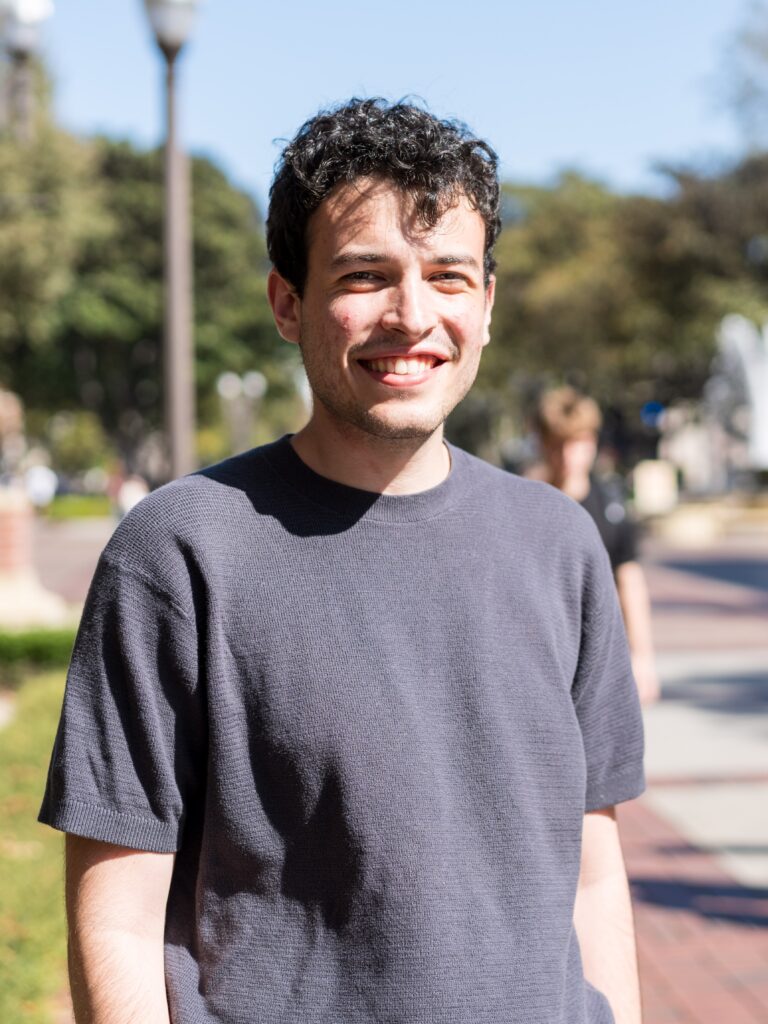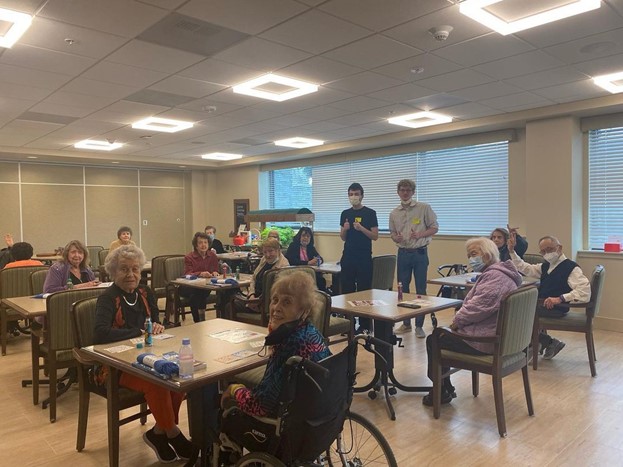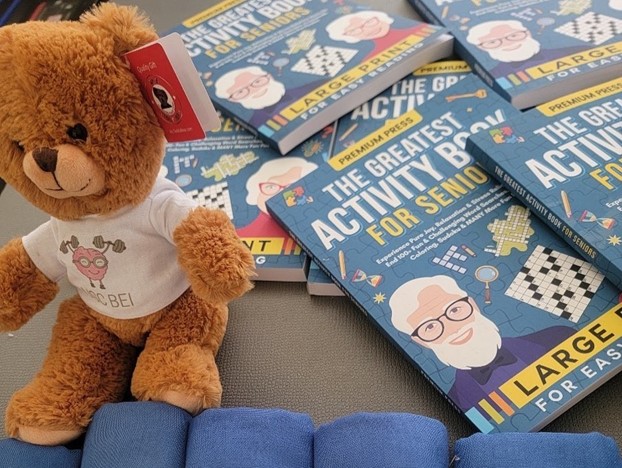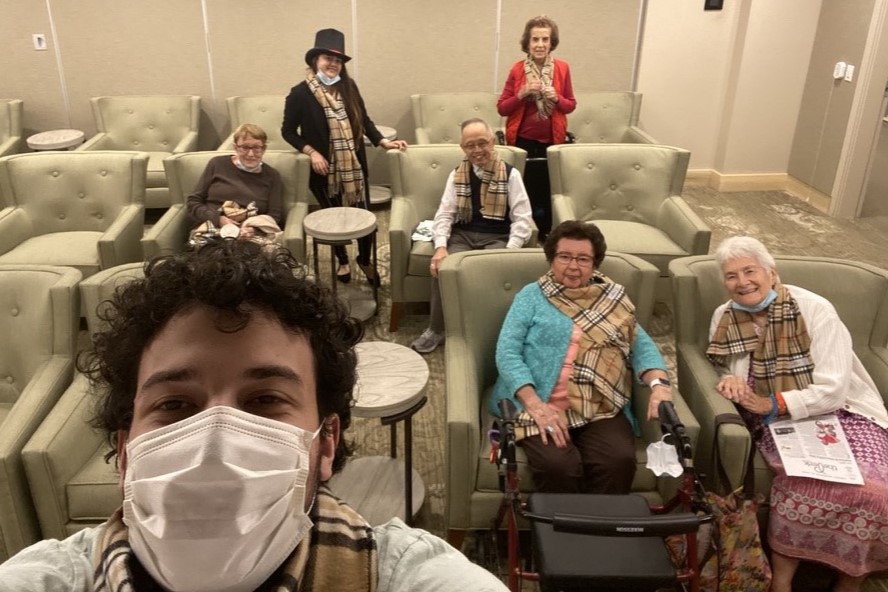About 45 minutes away from USC University Park Campus, the retirees living at Merrill Gardens at Rolling Hills Estates gather to play trivia and puzzle games. Shown on a screen are volunteers from USC’s Brain Exercise Initiative (BEI), a team of students leading math, reading, writing and trivia exercises for older people through virtual and in-person visits.
The residents call out their answers but also write them down, chatting with each other as they enjoy the fun. But the games also have a serious, therapeutic purpose—helping keep the participants’ memories sharp to ward off cognitive decline.

“The first couple of times I went to the sessions, the residents were a little skeptical,” says Benjamin Katz, a senior at the USC Mann School and president of USC BEI. “But as time went on, they really started to enjoy the sessions. I’ve noticed their improvement and got really connected with the seniors.”
Growing up in Encino, Calif., Katz comes from a family of physicians—his great-grandfather, grandfather, great-uncle, uncle and mother are all healthcare providers. “I’m hoping to continue the family tradition as a fourth-generation physician and help the community around me,” Katz says.
As a high school student at the Geffen Academy at UCLA, he took a college-level class in stem cells and their application in regenerative medicine. The class, an overview of Alzheimer’s, Huntington’s and Parkinson’s diseases, was Katz’s introduction to neurodegenerative conditions. He was immediately hooked.
“As a pharmacology and drug development major, I found neuropharmacology topics very exciting,” Katz says. “I was fascinated with the brain, cognition, neurodegenerative diseases and, of course, therapeutics.”
Daryl Davies, associate dean of undergraduate education and professor of clinical pharmacy at the Mann School, serves as BEI’s faculty advisor. “Benjamin is always positive and demonstrates everything we hope to see from our student leaders,” Davies says. “In my classes, he was always a top performer and always positive in his attitude and collaborative nature.”

Katz first heard about BEI while attending USC’s Involvement Fair in his freshman year. He immediately signed up for sessions and soon became a regular volunteer at Merrill Gardens. His commitment impressed his peers so much that they elected him president during his sophomore year.
As president, Katz strives to keep the brain exercises engaging by tailoring them to participants’ interests. For example, having added a music trivia segment, he noted how the residents’ faces “lit up” as they heard favorite songs from their youth. After learning that some residents loved opera and classical music, Katz began researching famous arias and opera singers to include in the trivia.
“Some residents turned out to be avid opera buffs. I learned a lot about opera from them, from Maria Callas to Pavarotti,” Katz says. “One of the residents loves to sit in her chair and pretend she is conducting the orchestra.”
BEI’s goal, Katz adds, is not only to improve cognition and memory but also build intergenerational relationships. “I’ve never thought the age gap was a problem at all,” the 21-year-old says.
“Benjamin’s leadership and creativity inspire those around him,” says Terry David Church, assistant professor of regulatory and quality sciences. “He has a unique ability to make people feel seen and valued.”
In one recent session, Katz found himself discussing ChatGPT with the residents. The topic made him realize that they remain well-informed about current events and enjoy sharing their views with college students.
“The seniors range from their 60s to 102, and they know how important it is to keep their brain active and going,” says Laura McNaughtan, active living program director at Merrill Gardens. “The residents enjoy reading subjects they may have forgotten about. When Ben brings up a packet, they are like, ‘Oh yeah, remember that?’ or ‘I forgot how to do this, but I remember now.’”
But while some residents take part to prevent cognitive decline, others are already showing symptoms of Alzheimer’s or dementia. Still, BEI’s services can benefit them all.

Katz recalls a woman in the retirement home’s memory care section who was initially hesitant about her ability to complete the quizzes. “To her surprise, she answered many of the math questions correctly, and a broad smile appeared on her face as her confidence improved, and she warmed up to the exercises,” Katz says.
And when the seniors are fascinated by the readings or the trivia, they tell Katz how much it impacts them. “That’s the most rewarding part for me,” Katz says.
“They just love the interactions when they can see Ben and other volunteers in person and on Zoom,” McNaughtan says. He has made such a difference in their lives, she adds, that “they ask, what’s going to happen when he graduates?”
Of course, the benefits go both ways, Katz notes. “The residents give us a lot of advice, and that allows the volunteers to have a valuable experience. You are used to talking to people around your age on campus, so it’s a really different experience to talk to people who have wisdom in their lives.”
Katz and his team are searching for the next president of BEI. “I want them to know that it’s an important mission, and not to be scared to engage with the seniors,” Katz says. “It’s one of the most rewarding and enjoyable things I have done.”
So the answer to the concerns of Merrill Gardens residents is that BEI will keep making a vital difference in their lives as they get to know the next president and other volunteers. Meanwhile, in terms of Katz’s own future, Church says, “I am excited to see all of the amazing things he will do.”
Jinny Kim contributed reporting.


